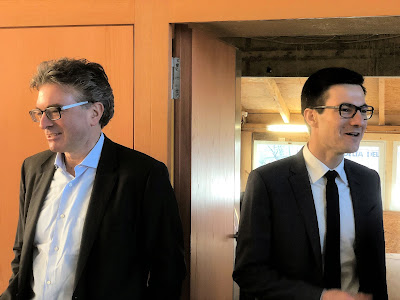Here are some of the slides Professor Fry showed and discussed:
The content of his slide on "The Challenges Facing the Trans-Atlantic Region" confirms the global shift. However, the high economic growth in Asia and other emerging markets is due to the backlog of demand in developing countries. Professor Fry's worries about the non-proliferation of western values like human rights, democracy, the rule of law, and capitalism are justified, although capitalism may not be the best export article. This is hard to accept for the devoted capitalist Fry.
On his slide "Lament for America Thesis," Professor Fry harped on his triple combination of globalization and rapid technology going in parallel with creative destruction. Indeed globalization lowered the percentage of the U. S. in terms of Purchasing Power Parity (PPP) on a global scale from 40% in 1967 to only 15,5% in 2015, i.e., to the value of the year 1900.
Creative destruction brings down once-thriving crafts and industries, replacing them with the outcome of new technologies. Digital photography brought to its knees once mighty "analog" Kodak, and coal miners were jobless with cleaner energy sources taking over. It does not help that POTUS, in yesterday's State of the Union message, touted, "We have ended the war on American energy, and we have ended the war on beautiful, clean coal." Yes, I know the slogan "Black is beautiful," but clean coal is fake coal.
The slide "America's 15 Domestic Fault Lines" lists problem areas in the States, most of which are also valid in the European Union (EU). So the explosion of entitlements and benefits is a severe problem in Germany, where state governments and the federal government kick down the road financing of acquired pension rights for their civil servants.
That the costs for health care will have only one direction: Going up, Red Baron wrote before. Although I knew that health care in the States is expensive, I did not realize that costs are more than twice as high in the US, i.e., 17% versus 8%, as in the EU.
Lacking education, a deteriorating infrastructure, and growing separatism are common problems. Whereas in Germany, federalism is considered an achievement, European countries with relatively strong central governments face separatist movements, i.e., North and South in Italy, Corsica in France, Catalonia in Spain, and Scotland in the United Kingdom.
The slide on "U. S. Government Debt" is frightening for me, but Professor Fry is optimistic about the US economy going strong.
Indeed, on the slide "If US States Were Nations 2016," the fact that the State of California alone has the economic strength of the UK is astonishing.
Professor Fry's last two slides, "America's Economic Strengths," are optimistically summarizing the solid economic positions of the United States.
At the end of the talk, I had many questions but held back, asking only, "Recently, the US has lowered the corporate tax considerably. Consequently, President Trump invited European firms to invest in America at the recent Economic Forum in Davos, Switzerland. Where will they find a skilled workforce when the present unemployment rate is as low as 4% in the States?"
Professor Fry corrected, "It is not only the low corporate tax but also the cheap energy that will attract investors," and continued, "The problem of the missing workforce can be solved by immigration." Mhm, I had many more questions, but others in the audience wanted to get their queries in too.
*





















